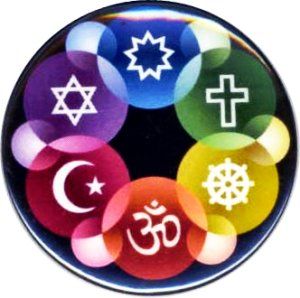
Psalm 25; Luke 21: 25-36
******** United Church of Christ
November 29, 2009 - First Sunday in Advent
This morning I did not preach a sermon for several reasons: I was out of town for a few days for Thanksgiving, I had been fighting a cold and sore throat earlier in the week, and I sang at a funeral at my home church on Saturday afternoon. I had planned on not writing a sermon because the constraints on my time but my usual preparation, that of reading and reflecting, did happen. And so I offered an abbreviated reading from chapter 1 of the book It's Really All About God: Reflections of a Muslim Atheist Jewish Christian by Samir Selmanovic which I blogged about recently.
Chapter 1 can be found here. However, I encourage you to purchase a copy or request one from your local library and read the book entire. This is an important book at an important time. Given the proximity we share with many different religions and also those of no religion, we need to learn the language not only of tolerance but also of curiosity, inquiry and respect.
Christians and Christmas have a way of steamrolling through the month of December as though we are the only show in town. If we who await the birth of Christ are serious about looking for the Christ, then we must seek out the Christ in unlikely places and peoples. And what do I mean by the Christ? The word "Christ" means "Anointed One", that one anointed to be sovereign in God's kingdom, but it can also mean one who is anointed with the Spirit of love, forgiveness, kindness, compassion, justice, and peace, which can come from any human heart focused on those things.
Reading this book at times has been like reading pages from my own experience. From the prologue:
******** United Church of Christ
November 29, 2009 - First Sunday in Advent
This morning I did not preach a sermon for several reasons: I was out of town for a few days for Thanksgiving, I had been fighting a cold and sore throat earlier in the week, and I sang at a funeral at my home church on Saturday afternoon. I had planned on not writing a sermon because the constraints on my time but my usual preparation, that of reading and reflecting, did happen. And so I offered an abbreviated reading from chapter 1 of the book It's Really All About God: Reflections of a Muslim Atheist Jewish Christian by Samir Selmanovic which I blogged about recently.
Chapter 1 can be found here. However, I encourage you to purchase a copy or request one from your local library and read the book entire. This is an important book at an important time. Given the proximity we share with many different religions and also those of no religion, we need to learn the language not only of tolerance but also of curiosity, inquiry and respect.
Christians and Christmas have a way of steamrolling through the month of December as though we are the only show in town. If we who await the birth of Christ are serious about looking for the Christ, then we must seek out the Christ in unlikely places and peoples. And what do I mean by the Christ? The word "Christ" means "Anointed One", that one anointed to be sovereign in God's kingdom, but it can also mean one who is anointed with the Spirit of love, forgiveness, kindness, compassion, justice, and peace, which can come from any human heart focused on those things.
Reading this book at times has been like reading pages from my own experience. From the prologue:
"...I know I cannot survive without some kind of certainty. To live, I need some stable ground to live on, a soil from which I can sustain my life, a place where I can pitch my tent, a landing where I can make friends.Right now I would describe myself as a Buddhist Agnostic Goddess 12-step Christian. Those are the five traditions so far that have informed my sense of the dual mystery of love and life but it is the Christian story that first captured my heart and made a claim upon my life and still does. If we are true to our faith and to God, one religion or worldview cannot possibly capture the essence of this mystery we call God. We must learn to be open to the other, as Selmanovic puts it, if peace is ever to come on earth.
"...To create a new empty space within, I decided to let some uncertainty enter my life, and I wish I could say the experience has been wonderful. It hasn't. It feels like stepping on a makeshift bridge, suspended, with firm ground left behind and no assurances of what I might find beyond the thick fog in the front. Questioning my own certainties has been a lonely, painful experience. Uncertainty hurts. Yet it is uncertainty that has been saving my life. Doubt would carry me. When I allowed more questions to serve as vessels of my faith, life could win. And expand. I could grow deeper, where fresh, strong new currents of faith could be found."











